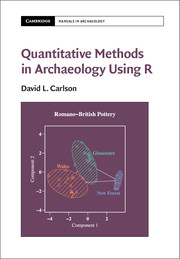Book contents
- Frontmatter
- Contents
- List of Figures
- List of Tables
- List of Boxes
- Acknowledgments
- 1 Introduction
- PART I R AND BASIC STATISTICS
- 2 Introduction to R
- 3 Looking at Data – Numerical Summaries
- 4 Looking at Data – Tables
- 5 Looking at Data – Graphs
- 6 Transformations
- 7 Missing Values
- 8 Confidence Intervals and Hypothesis Testing
- 9 Relating Variables
- PART II MULTIVARIATE METHODS
- PART III ARCHAEOLOGICAL APPROACHES TO DATA
- References
- Index
9 - Relating Variables
from PART I - R AND BASIC STATISTICS
Published online by Cambridge University Press: 22 July 2017
- Frontmatter
- Contents
- List of Figures
- List of Tables
- List of Boxes
- Acknowledgments
- 1 Introduction
- PART I R AND BASIC STATISTICS
- 2 Introduction to R
- 3 Looking at Data – Numerical Summaries
- 4 Looking at Data – Tables
- 5 Looking at Data – Graphs
- 6 Transformations
- 7 Missing Values
- 8 Confidence Intervals and Hypothesis Testing
- 9 Relating Variables
- PART II MULTIVARIATE METHODS
- PART III ARCHAEOLOGICAL APPROACHES TO DATA
- References
- Index
Summary
In Chapter 8, we used one categorical variable to define groups and examined differences in a numeric variable between the groups. The grouping variable was treated as an explanatory or independent variable while the numeric variable was the response or dependent variable. This relationship was indicated by the fact that the explanatory variable was on the right-hand side of the formula and the response variable was on the left side of the formula (for the Snodgrass example, Area~Segment). This terminology suggests some kind of causal relationship between the variables.
Statistical tests do not tell us which one is which or even if the relationship is causal, but they can draw our attention to the fact that when one variable changes, another one changes as well. Another way of looking at this is to say that one variable allows us to make predictions (or projections or forecasts) about another variable. This chapter focuses on methods we can use to identify variables that vary with one another. In some cases, it is clear which variable is the explanatory variable and which is the response. In other cases, the distinction is irrelevant because the statistic is symmetrical. In looking for relations between variables, we usually have one of two goals. Either we are looking for a measure of association that tells us how strongly two variables co-vary (e.g., correlation) or we are looking for a way to use one variable to make predictions about another variable (e.g., regression).
CATEGORICAL DATA
When the two variables are categorical, we generally use the Chi-square test to determine if the two variables are independent or associated. If they are independent, knowing the value of one variable does not improve our ability to guess the value of the second variable. Coin tosses are independent. If I toss a coin and the result is heads, it does not improve my ability to predict a second toss of the coin. This concept of independence underlies the Chi-square test and represents the null hypothesis.
- Type
- Chapter
- Information
- Quantitative Methods in Archaeology Using R , pp. 190 - 216Publisher: Cambridge University PressPrint publication year: 2017



